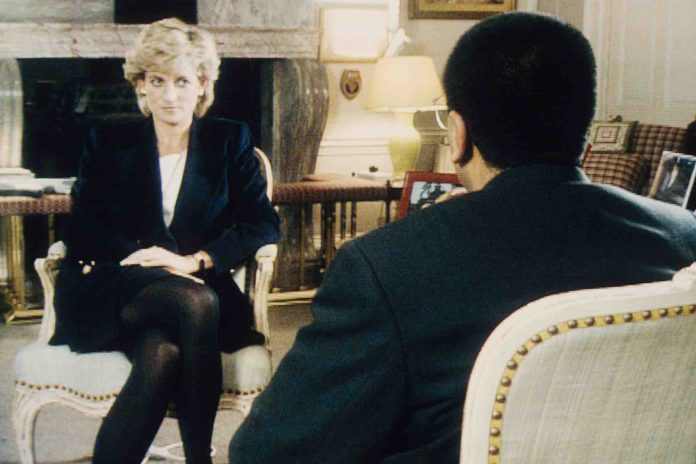Queen Elizabeth II has long been said to adopt the mantra “never complain, never explain” in a bid to keep family matters behind closed doors; not become embroiled in media reports or speculation; and maintain the much-distinguished line between royalty and public. Largely this approach has worked, with the family circling the wagons at the hint of danger or scandal.
But on 20 November 1995, Princess Diana broke ranks. The then-35-year-old decided that instead of protecting her in-laws and husband, from whom she had separated, she wanted to tell her side of the story. She agreed to a BBC One Panorama interview with Martin Bashir.
Not only was the interview a sign that Diana was stepping away from the fold because she was candidly engaging with the media (she did not shy away from difficult questions), but because the contents of the interview felt like a soap opera in their own right: adultery, palace plotting, mental and physical illness, and the future of the monarchy as seen by an insider.
The TV interview was the first ever solo interview for the Princess of Wales, and happened just nine months before her divorce, and subsequent death in 1997, cementing its place in television history. Now, an investigation into how the BBC and Bashir landed the interview with Diana will reportedly conclude the journalist used deceitful methods and broke BBC editorial rules to secure it.
But what about it was so controversial?
The contents of the interview
Not only had Princess Diana agreed to go on live television and be candidly interviewed – something that would not really be seen again until Prince Andrew’s Newsnight special in November 2019 – but she also did not shy away from difficult questions.
The Princess of Wales answered questions on everything from her self-harm, to suffering with bulimia, her own affair and unfaithfulness to Charles, his involvement with Camilla Parker-Bowles, the lack of support she felt from the royal family, and her doubts over the heir apparent’s future as King of England.
The level of detail divulged was summed up perfectly in Diana’s now infamous phrase: “Well, there were three of us in this marriage, so it was a bit crowded.”
The Queen was not happy
The Queen famously described 1992 as her “annus horribilis” or “horrible year” – the year that saw Charles and Diana separate, the Duke of York split from Sarah Ferguson, a fire at Windsor Castle, and the publication of Andrew Morton’s explosive biography on Princess Diana.
In the interview Diana admitted she had allowed her friends to talk to Morton for his book, although said that she herself had not done so. “I was at the end of my tether. I was desperate. I think I was so fed up with being seen as someone who was a basket-case, because I am a very strong person and I know that causes complications in the system that I live in.”
But she admitted she knew it had badly affected the royals. “I think they were shocked and horrified and very disappointed,” she said.
Sir Richard Eyre, ex director of the National Theatre, told a Channel 5 documentary, Diana: The Interview That Shocked The World in 2020, that he had lunch with the Queen in 1995 and she was upset by the interview.
He claimed: “I had lunch with the Queen not long after and she said to me unprompted, ‘How are things at the BBC?’ and I said, ‘Oh well, fine’. And she said, ‘Frightful thing to do, frightful thing that my daughter-in-law did’.”
Richard Ayre, the BBC’s controller of editor policy at the time, told Channel 5: “Right at the beginning we had agreed that the princess should be allowed to be the person who broke the news to the palace.”
Seen as retaliation at Prince Charles
During the interview Bashir asked Diana if she was concerned that it would be portrayed as her retaliating at her husband. She denied the claim: “I don’t sit here with resentment: I sit here with sadness because a marriage hasn’t worked. I sit here with hope because there’s a future ahead, a future for my husband, a future for myself and a future for the monarchy.”







